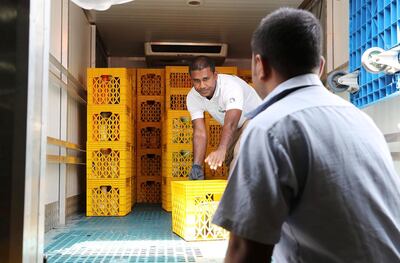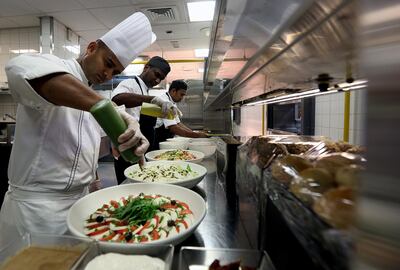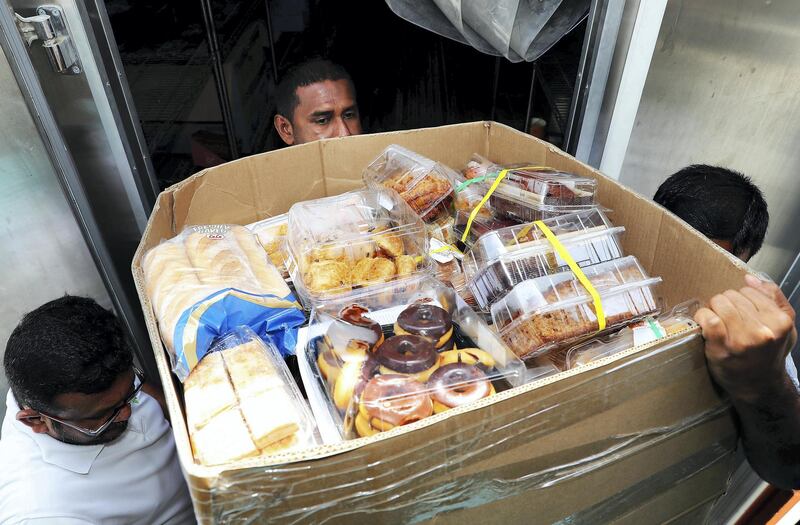Dubai's food banks are urging more hotels and supermarkets to donate leftovers to their campaign, as hundreds of thousands of tonnes of food continue to go to waste every month.
Dubai Muncipality has asked companies to get involved and ensure food that could be donated is not sent to landfill.
About 232 tonnes of food from hotels, restaurants and supermarkets were collected in the first quarter of the year.
Officials said companies were showing commitment, but there were problems packaging and transporting food to the main site in Al Quoz.
The UAE Food Bank was set up last year to highlight waste and encourage the industry to donate to those less fortunate.
“We can have issues with logistics,” said Noura Al Shamsi, head of food permits at Dubai Municipality.

"Some hotels are facing problems with the packaging of the food. We are trying to engage more volunteers to help the hotels with the packing ... but we also need the supermarkets and hotels to be more active."
While collections have helped to alleviating the problems caused by excess food from the hospitality sector and supermarkets, Ms Al Shamsi said people needed to be more aware of the options if a long-term solution is to be found.
"People need to know that the food banks can only do so much. People should not waste food," she said. "People need to shop smart and waste less."
As well as coming last of the 34 countries in the 2017 Food Sustainability Index in terms of sustainable agriculture, the UAE has also been ranked 34th and last in terms of how much food is wasted.
Leading hotels and supermarkets signed up to the food banks programme, which involves the municipality collecting food each morning and taking it to depots located in Al Quoz and Al Bada where it is distributed to local charities and 80 sharing fridges across Dubai. But even that system creates logistics issues.

“We had a partnership a few years ago to be part of the food banks programme. What we noticed though was there was a problem in terms of transporting the food and in keeping it at the right temperature in hot weather to keep it safe,” said Shawn Aoki, executive sous chef at Fairmont Dubai.
Mr Aoki said: “There isn’t a huge amount of food left over, to be honest, so sharing it with the staff solves the problem.”
Another problem Dubai Municipality faces is the misconception that sharing fridges are open only during Ramadan.
“We want people to be aware that the sharing fridges are open all year round,” said Ms Al Shamsi said. “We have received many more requests for fridges in different neighbourhoods and it is something we are trying to pursue.”
At the moment, in addition to the 80 fridges in Dubai there are 10 in Ajman and 10 in Ras Al Khaimah.
_______________
Read more:
Dubai hotels and restaurant lavish spreads are a major source of waste say experts
_______________
"We are also starting to communicate with our counterparts in Abu Dhabi to start similar initiatives there," Ms Al Shamsi said.
One property that is signed up to the food banks programme is Dubai’s Armani Hotel.
Speaking last month, Abdul Quddus Sheikh, director of engineering at the Armani, said: "We offer smaller portions than we did in the past. There is still an issue, of course, if we are hosting an event for 500 people and only 200 people show up.
“What happens to all that extra food? We freeze it and distribute it to the food banks, so there is absolutely no waste.”
Girish Babu, chef at Dubai’s Media One, said the days of hotels cooking extravagant amounts, regardless of how many people might be in attendance, are coming to an end.
"At Media One we do all we can to reduce food waste to a minimum. We carefully plan quantities and take bookings so that we do not prepare too much," he said.
“We tend to feature live cooking stations so that items can be cooked to order.”
Spinneys supermarket, which donates food to Dubai’s food bank, said the onus to save must be on businesses and customers alike.
Colette Shannon, communications manager for Spinney’s, said “the percentage of the food, purchased at home, that ends up as waste is crazy”.
Changing how food is prepared is key to eliminating waste, she said. “We are mindful to offer choice to our customers. We are working with suppliers to provide smaller pack sizes so a single person doesn’t have to buy more food than they need.”







